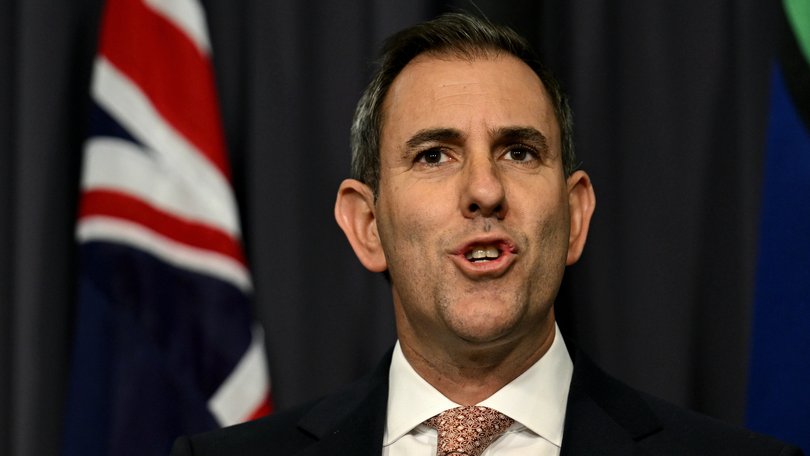Australian news and politics live: Chalmers signals willingness to negotiate super tax, Teal takes Bradfield
LIVE UPDATES: Treasurer Jim Chalmers says he’s open to working with the Coalition on Labor’s plan to tax superannuation balances, meanwhile Nicolette Boele has secured the seat of Bradfield.

Scroll down for the latest news and updates.
Key events
04 Jun 2025 - 03:51 PM
O’Brien ‘shut the door’ on super deal, defends Bradfield leadership vote
04 Jun 2025 - 03:06 PM
Kapterian to review Bradfield result as Boele claims win
04 Jun 2025 - 02:59 PM
O’Brien ‘saddened’ by Kapterian’s loss in Bradfield
04 Jun 2025 - 02:20 PM
Defence, dollars and the boogying bandit
04 Jun 2025 - 01:21 PM
Boele officially wins Bradfield by 26 votes
04 Jun 2025 - 01:02 PM
Chalmers rejects tobacco tax freeze amid illegal trade surge
04 Jun 2025 - 11:47 AM
Conroy: Government ‘open’ to defence spending hike to meet ADF needs
04 Jun 2025 - 11:27 AM
National Press Club: ‘She didn’t fight’ myths and police failures are undermining justice for survivors
04 Jun 2025 - 11:06 AM
Defence Industry Minister reveals key lessons of Ukraine war
04 Jun 2025 - 11:01 AM
National Press Club: ‘Investment far outstrips the financial and human cost of sexual violence’
04 Jun 2025 - 10:57 AM
National Press Club: ALRC calls for trauma-informed justice and new support pathways
04 Jun 2025 - 10:49 AM
Chalmers: I’m optimistic about the future of our economy
04 Jun 2025 - 10:46 AM
National Press Club: Justice system ‘cannot fix’ sexual violence alone, Bromberg warns
04 Jun 2025 - 10:43 AM
Chalmers: PM will be eligible for super tax, calls out ‘lies’ about it
04 Jun 2025 - 10:33 AM
Chalmers: SMSF changes ‘modest’ but Labor open to ‘engagement’ with Coalition.
Defence Industry Minister reveals key lessons of Ukraine war
Defence Minister Pat Conroy has described Kyiv’s surprise mass drone strike on Russian long-range bombers this week as “remarkable,” calling rapid technology development a major lesson of the Ukraine war.
“I think one of the key lessons is obviously the rapid speeding up of not just production, but technology development cycles,” Mr Conroy told the ASPI defence conference in response to a question from Ukrainian Ambassador Vasyl Myroshnychenko.
“Everyone’s obsessed with drones, and for good reason, but the development cycle of that, and obviously your recent strike was remarkable,” he said.
“Technology cycles wait for no one, and while we will continue to invest in some very high end, exquisite platforms that are critical to the defence of the nation, you can’t put all your eggs in one basket.
“Another of the lessons of Ukraine is industrial resilience and the need to have a plan post the first three days of a conflict,” said the Minister.
National Press Club: ‘Investment far outstrips the financial and human cost of sexual violence’
At the National Press Club, Justice Mordy Bromberg, President of the Australian Law Reform Commission, outlined key recommendations from the ALRC’s major inquiry into justice responses to sexual violence, focusing on the need for greater police accountability and expanded pathways to justice for survivors.
“The ALRC considers the greatest scrutiny and accountability of police behaviour and decision-making is required… we recommended that each state and territory establish a task force to review all reports of sexual violence made to police within the last 12-18 months.”
Justice Bromberg called for independent review mechanisms, so complainants can challenge police decisions not to proceed with charges. He also emphasised the need to make civil justice and restorative justice pathways more accessible, recognising that survivors have diverse needs beyond criminal convictions.
“Reducing financial barriers and giving expanded access to cheaper and quicker tribunal processes for dealing with sexual harassment, shifting the burden of and responsibility for addressing sexual harassment from the individual harmed, to organisations and regulatory bodies.”
“The investment necessary is well justified. It far outstrips the financial and human cost of sexual violence remaining widespread, under-reported and, in the words of the national plan, in the shadows.”
National Press Club: ALRC calls for trauma-informed justice and new support pathways
“We need to improve education and training about trauma for police, for prosecutors, lawyers and for judges, to strengthen police and prosecution guidelines to better prevent traumatisation and the high rates of disengagement.”
Mr Bromberg argued that giving complainants access to their own legal advice and representation is crucial, as is enforcing rules against inappropriate questioning in court.
He highlighted the need for a “safe, informed and supportive place to disclose” sexual violence, pointing to frontline sexual assault services as best practice.
The ALRC (Australian Law Reform Commission) proposes that every survivor, no matter where they live, should have access to legal assistance and a “justice system navigator”—a support person to guide them through the process.
“These services are also well-placed to connect people who have experienced sexual violence to the legal advice they desperately need… That is a support person who will walk alongside and guide complainants through the criminal justice system.”
Chalmers: I’m optimistic about the future of our economy
Treasurer Dr Jim Chalmers has been asked whether these numbers are as good as it gets.
Naturally, he disagrees with that.
“My view is that I am quite optimistic about the future of our economy,” he said, pointing to a series of one-offs that caused a slowdown in growth including a Cyclone Alfred and the recent floods.
“We shouldn’t over interpret that March data, but growth is softer than we would like it to be, and I’m confident that growth will accelerate in our economy.
“Most of the rest of the world looks at Australia, and they see low unemployment, lower inflation, interest rates coming down, real wages and incomes growing. Debt to GDP is much smaller here than in most other countries.
“Most of the rest of the world sees what’s happening in Australia, and they think that there are some very good things happening in Australia. It’s a compelling story, but I firmly believe that there are good reasons to be optimistic about our economy.”
National Press Club: Justice system ‘cannot fix’ sexual violence alone, Bromberg warns
Bromberg was speaking as President of the Australian Law Reform Commission, outlining the findings of a landmark 12-month inquiry into justice responses to sexual violence, which has just delivered its final report to parliament.
“Sexual violence is experienced in Australia, in endemic proportions, but out of control in the sense that no strategy has yet effectively addressed the problem.”
Mr Bromberg highlighted a stark lack of accountability, noting that “only about 2 per cent of women who say they’ve been subjected to sexual violence are able to overcome the barriers to access to justice,” and that “most people who perpetuate sexual violence face no consequences for their wrongdoing.”
He argued the justice system bears significant responsibility for these barriers: “Many of the barriers to engagement with the justice system for people who have experienced sexual violence are barriers for which the justice system bears some responsibility.”
Bromberg says while the justice system cannot solve the crisis alone, “the problem of sexual violence cannot be addressed unless the significant failings of the justice system are rectified.”
Chalmers: PM will be eligible for super tax, calls out ‘lies’ about it
Dr Chalmers has welcomed a question about whether the Prime Minister will be subject for the same tax on super balances over $3m.
“I’m so pleased you asked me this question, because people have been lying about this,” he said.
“We’ve had people, I think shamefully, say that the Prime Minister or other senior politicians at the federal level on defined benefits, are somehow exempt from this change. They are not.”
He said the Prime Minister, and other eligible parties, won’t be paying tax on those unrealised gains annually due to the nature of the defined benefits scheme but would instead accrue tax with interest.
“We charge an interest rate on those liabilities to make sure that people don’t receive an inappropriate advantage from the necessity of calculating and paying those liabilities on retirement.
“You have to be very careful with what some people, including some of the lower echelons of our political opponents, (have) said, and unfortunately, some of those things which have been reported as fact.
“Defined benefit schemes like the Prime Minister’s are in. They’ve been in all along.”
Chalmers: SMSF changes ‘modest’ but Labor open to ‘engagement’ with Coalition.
Treasurer Jim Chalmers is addressing concerns about Labor’s planned tax on superannuation balances over $3m and said he is open to “engagement” with the Coalition if it meant getting the legislation through.
On the taxing of unrealised capital gains, Dr Jim Chalmers said, “if there is a better, fairer way of making this calculation, tell us about it.
“The unrealised gains calculation was recommended to us by Treasury. We provided years of opportunities for people to suggest different ways to calculate that liability, and nobody has been able to come up with one.
“It’s been on the books for years now, and it makes a meaningful difference to the budget, and it helps us fund some of our other priorities. It’s all about making sure that the superannuation system is fairer, that it’s more sustainable.”
Treasurer Chalmers on the slowdown in GDP growth
Treasurer Jim Chalmers is fronting the media after weaker than expected growth in the March quarter.
He has called out reduced Government spending, natural disasters and global uncertainty as key factors behind the slower growth.
Bright spots are an increase in private demand and a recovery in disposable incomes.
“All of the growth in the March quarter was from the private sector, and that’s a good thing,” Dr Chalmers said.
Despite a fall in GDP per capita, the Treasurer is spruiking a rise in disposable incomes per capita.
“The measure of real incomes per capita was up 1.1 per cent in the quarter. That was the third consecutive quarter of growth. Now remember, real incomes were falling 1.7 per cent when we came to office and they’re now up 1.7 per cent through the year.
“That is a welcome development,” Dr Chalmers said.
Liberals lose grip on Bradfield as recount puts independent Boele ahead
Teal independent Nicolette Boele is on track to win the once-safe Liberal seat of Bradfield, following a nail-biting recount that has her ahead by just 27 votes.
Despite Liberal candidate Gisele Kapterian winning the initial count by eight votes, the tight margin triggered an automatic recount. The latest tally has tipped the balance in favour of the Climate 200-backed independent.
Sky News has called the seat for Ms Boele, and the Australian Electoral Commission is expected to confirm the result later today.
An AEC spokesperson said approximately 99.9 per cent of votes had been counted, with Ms Boele narrowly in front.
The northern Sydney electorate was previously held by former Morrison government minister Paul Fletcher, who retired at the last election.
More to come...
Australia’s slow economy revealed in GDP figures
Australia’s economy grew just 0.2 per cent in the first three months of the year, according to the latest data from the Australian Bureau of Statistics.
Through the 12 months to March, growth was 1.3 per cent.
“Economic growth was soft in the March quarter,” ABS head of national accounts Katherine Keenan said.
“Public spending recorded the largest detraction from growth since the September quarter 2017.
“Extreme weather events reduced domestic final demand and exports. Weather impacts were particularly evident in mining, tourism and shipping.”
The period covered the Reserve Bank’s February rate cut and was prior to US President Donald Trump’s “liberation day” tax hikes on trade.



